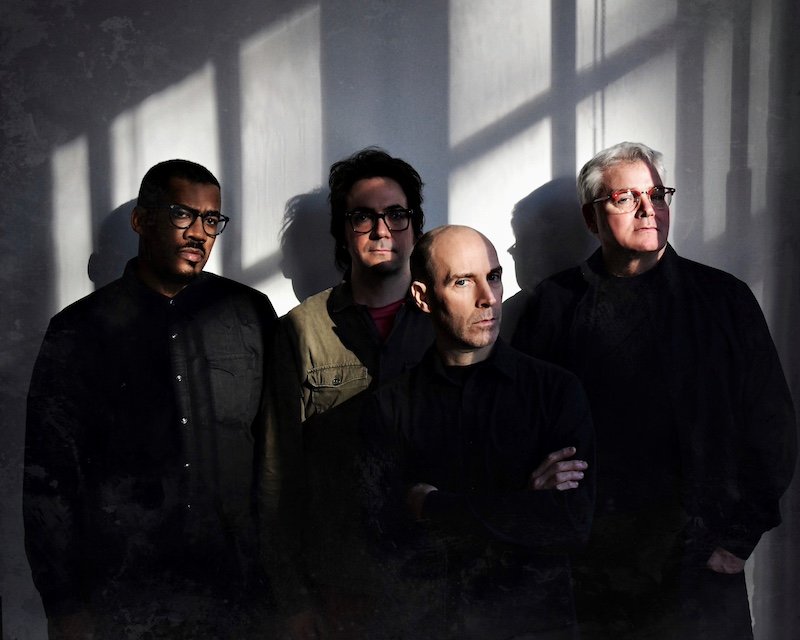In punk-inflected jazz group The Messthetics, guitarist Anthony Pirog flies above Fugazi's rhythm section
The Washington, D.C. trio will be joined by saxophonist James Brandon Lewis at the Vancouver International Jazz Festival for an evening of genre-blurring virtuosity
The Messthetics with James Brandon Lewis.
The Vancouver International Jazz Festival presents The Messthetics with James Brandon Lewis at Performance Works on June 23
AN UNLIKELY GHOST hovers over The Messthetics: the spirit of Danny Gatton, perhaps the most freakishly talented if ill-fated guitarist to emerge from the United States since the advent of Jimi Hendrix. Admittedly, Gatton might seem a peculiar inspiration for the Washington, D.C. trio, which sounds nothing like the late fretboard wizard’s inimitable blend of rockabilly élan, hi-fi audio trickery, and blazing cowboy-bebop chops. Yet Gatton—and his home base, the fabled Birchmere music hall in the Washington suburb of Alexandria, Virginia—played a crucial role in the Messthetics’s entertainingly unruly blend of avant-garde guitar sorcery and punk-rock dynamics.
“What happened,” Messthetics guitarist Anthony Pirog explains, “was that I was doing a lot of playing around D.C…..I was pretty busy, and I didn’t know that [future Messthetics drummer] Brendan Canty had been to my shows. And Janel [Pirog’s partner, cellist Janel Leppin] and I had a show at the Fringe Festival in D.C., and Brendan was doing a set with a bass player the same night, so we shared a bill.
“We were talking, and he told me he was coming out to see me. And I was surprised because he came to a Danny Gatton tribute that I had taken part in at the Birchmere. So I said ‘Oh, you’re into Danny Gatton?’ And he said,‘Yeah! I love Danny Gatton!’ So we kind of hit it off.”
That’s maybe not what you’d expect to hear from Canty, the longtime drummer for the iconic D.C. hardcore band Fugazi. But in a way, Gatton embodied the ethos of the D.C. scene, which is characterized by an openness to all sounds, from bluegrass to funk to punk.
At around the same time that Pirog and Canty were bonding, the latter’s partner in the Fugazi rhythm section, Joe Lally, had just returned from an extended stay in Italy. It seemed natural for the three to jam, and things clicked—but not quite in the way they’d originally intended. “Joe wanted to start a trio performing his original music, where he would sing, and Brendan recommended that they try me out. They asked me to come and play at Brendan’s rehearsal space, and we played one time, and it was really fun, and everyone had a good time—and nothing really happened beyond that.
“So I waited a couple of months to kind of build up the courage to ask if they would be interested in being the rhythm section on this record I wanted to make, and when I asked them, they said ‘Well, why don’t we just start a band?’”
The chemistry between the three players is readily audible on their two albums as a trio, their eponymous debut and its follow-up Anthropocosmic Nest. As Pirog happily reports, Canty and Lally play with such intuitive rapport, honed through countless gigs and dozens of tours, that he’s simply allowed to fly. “When I got together to play with them, the first thought I had was ‘Oh, my god! This feels so solid and good. I can do anything on top of this and it will be okay,’” he explains. “I mean, it’s so locked, and that’s really inspiring to play with. And the dynamics, the level of intensity, is very exciting, too. We can just rock out.
“But aside from that side of the playing, to work with them has been extremely rewarding, because they’re really good at arranging, and have really good ideas when it comes to piecing songs together to keep things moving.”
And now, with the inclusion of saxophonist James Brandon Lewis—a one-off experiment that has since become a full-time collaboration—the group has added an especially human element to its sound. Again, fate played a role: Pirog and Lewis were introduced by the veteran free-jazz drummer William Hooker during a recording session. “James was the one person I didn’t know,” Pirog says, “and I saw him kind of watching me while I was playing. He was kind of focusing on what I was doing; I could tell he was really listening. And after the session was over we just started talking and went out to get something to eat. I was concerned that he didn’t like what I was doing, but we became friends just immediately. Like, I never go out and socialize after things like that; I’m usually too worked up. But we just started talking and developed a friendship almost immediately—and from then on, whenever we were in New York, we asked James to sit in.”
The quartet’s self titled debut, out now on the prestigious Impulse label, is almost impossible to characterize—except that it’s the kind of “jazz” that jazz fans might play for their pop- and rock-loving friends. Lally and Canty don’t swing in any conventional manner, but their rhythmic connection is undeniable, marked by both propulsive force and great sensitivity to texture. Compared to his work with the trio Location Location Location, Pirog holds back on the guitar-hero pyrotechnics, but he’s dazzling nonetheless. And Lewis, who’s rooted in the African-American gospel tradition as well as in the spiritual jazz of Albert Ayler and John Coltrane, often takes on the role of “singer” in the most spell-binding way.
“When Brendan played Boatly for his daughter, she was like, ‘Is this a human voice?’” Pirog notes. “Especially when James cuts loose at the end of that track, it’s… It’s a cry. It has the same emotional aspect. It’s like when you hear certain Pharaoh [Sanders] recordings: it’s just so human.”
Cutting-edge jazz with punk energy and a deeply soulful feel? That still falls short of fully describing what the Messthetics and Lewis do, but it’s a start—and there’s more to come. ![]()













